
Master’s program in
Innovations and Society: Science, Technology and Medicine
The program is focused on training specialists of a unique interdisciplinary orientation, who will be able to explore, manage, and accompany the application of scientific and technological developments in the innovation process with understanding of the complexity of social processes
Students of this program can take an internship at the University of Maastricht, the Free University of Amsterdam, and the University of Plovdiv (Bulgaria) with getting an official certificate
A graduate of the Master’s program will acquire competences for the interdisciplinary research and practical skills for implementation of innovative projects within various public and private sector organizations.
This unique and interdisciplinary program is developed with support of the European University at St. Petersburg and the Maastricht University (the Netherlands), which is suitable for graduates of different fields: humanities, engineering, natural science, management in the field of science, innovation, and health. The program also suits managers and residents of innovative institutions, innovators, and technology entrepreneurs.
The aim of the program is to prepare highly qualified and competitive specialists, who can explore, manage, and support the application of scientific and technological developments in the innovation process with understanding of the complexity of social processes.
Students will gain experience in the social innovation research, analysis of interaction and mutual influence of innovation and society, based on real case studies and data management. Also, they will be able to develop skills in the interdisciplinary research, data collection and analysis, and to work with databases, including patents.
Advantages
Lecturers of the program are representatives of the new generation of researchers. These are lecturers, who have degrees of Doctors / Candidates of Science in Sociology, Political Science, or Philosophy (Ph.D.) or Ph.D. and an international academic and research experience, which were gained in foreign universities: the London School of Economics and Political Science, the University of Michigan, the University of Helsinki, the University of J. Washington, and the University of California at Berkeley.

Visiting professors are those from the leading universities of Russia and the world and give lectures in Russian and English.
This program is suitable for training a wide range of students: graduate students, young scientists of various scientific areas (fundamental and applied sciences, engineering and humanities, and medicine) and specialists from different spheres, such as management (in public health and innovative institutes), innovative production, and R&D in private companies.
Demand of graduates
This Master’s program trains specialists, which are in demand in accordance with the current technological development. Graduates of this program are specialists with applied and theoretical knowledge and expert and analytical skills, based on understanding of the current tendencies of development of innovations and society.
Orientation at practice
The program forms a range of loyal companies and professional communities, which will become expert consultants for the program and its end consumers. This will be done by allocating projects to implement to the students and recruiting graduates of the program, who will prove themselves while working on the projects.
Advantages
- Involvement of the leading partners from public organizations and private businesses
- Participation in international research projects
- The internships in the leading companies and universities
- The training with the best specialists
Academic discipline
The program includes original author courses, which have no analogues in Russia, and consists of two specializations.
Specialization “Innovation in the field of health and medicine” includes courses in:
- Social research of governance in health and disease
- Integrative approaches to health
- Innovations for human and social health
- Dilemmas of decision-making in health systems
Specialization “Management of technical science” includes courses in:
- Social studies of science and technology (STS, Science and Technology Studies)
- Management of laboratories and scientific activities
- Scientific and technical politics and society
- Practical social research of science and technology
The basic part of the program is:
- Management of innovative projects
- Method of data collection and the design of social research of scientific and technical processes
- Integrative approaches to healthcare
- Making science and technology work for health
- Dilemmas of Health Governance in Transition
Our professors
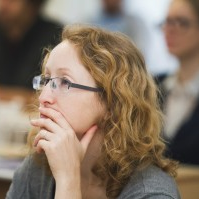
Evgeniya Popova
Director of REC PAST-Centre, National Research Tomsk State University
PhD, Associate Professor of the Department of Political Science, National Research Tomsk State University.
Evgeniya completed her graduate studies at the European University at St. Petersburg. In 2003, she defended her thesis in Political Science (Moscow, Moscow State Institute of International Relations). She received training at the University of Michigan (Ann Arbor, Center for Political Studies, 2008-2009) and the London School of Economics and Political Science (UK). Evgeniya participated in research projects, including as a lead researcher, supported by the following organizations: the Human Resources Federal Target Program, the Fund of Infrastructure and Educational Programs at OJSC RUSNANO, RVC, National Research University Higher School of Economics (HSE), Interregional Studies in the Social Sciences, the Academy of Finland, ACLS, and the Ford and Carnegie Foundations. Laureate of the Tomsk region award in Science, Culture, and Education. She twice won the competition of Russian Associations of Political Science.
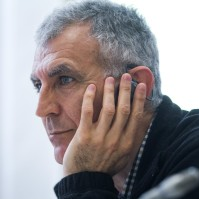
Ivan Tchalakov
Ivan is a Research Fellow at REC PAST-Centre, National Research Tomsk State University, Associate Professor of the Department of Institutional and Applied Sociology, University of Plovdiv, and Senior Research Fellow at Technology Studies Group, Institute of Studying Societies and Knowledge, Bulgarian Academy of Sciences.
Between 1999 and 2003, he was elected as the President of Bulgarian Sociological Association. He got M.A. in Sociology at the University of Sofia (1984) and PhD at the Institute of Sociology, Bulgarian Academy of Sciences (1988). He was collaborating with prof. Karin Knorr-Cetina to conduct research in ethnographic studies of the scientific and engineering practice at optical labs of Bulgaria and Germany. Since the middle of 1990s, he has also extensively studied the transformation of the research and innovation systems in post-socialist countries and has been focuses on science and technology development in South-Eastern Europe after WWII.
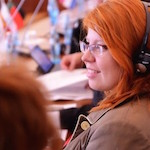
Olga Ustyuzhantseva
Olga is a Research Fellow at the REC PAST-Centre, National Research Tomsk State University. She is a Candidate of Science in History (PhD). In 2014, she defended the thesis “The Evolution of Indian Scientific, Technological and Innovative Policy in 1991-2013”. She studies grassroot innovations in BRICS countries and public policy in inclusive innovations of these countries. She is the Leader of projects connected with providing the scientific, technological, and educational collaboration between Russia and India and curator of the Indian public program “Global Academic Initiative” in Russia.
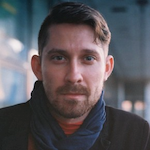
Andrey Kuznetsov
He is a Senior Researcher at the REC PAST-Centre, National Research Tomsk State University and Associate Professor of the Department of Sociology at Volgograd State University. He is the author of scientific and educational project “ANThology: Introduction to the Actor-network theory”. He translates Bruno Latour’s and Dirk Bekker’s texts. He currently works as the co-author of the book New Technologies and “Old” People: Users of a Personal Computer of the Third Age.

Olga Zvonaryova
Olga is a Research Fellow at the REC PAST-Centre, National Research Tomsk State University. She received a PhD from the University of Maastricht, the Netherlands, defending her thesis on pharmaceutical innovations. Earlier at the same university, she graduated from the Master’s program in Global Health. In her work, she studies processes and dynamics of innovations in (bio)medicine. Olga actively participates in international and interdisciplinary projects in the field of Public Health and Control of Infectious Diseases. She is the Deputy Head of the international educational project Education Capacity Building in the Eastern European Neighboring Areas: Health, Innovations and Societies / Development of Education in Eastern Europe: Health, Innovation and Society.
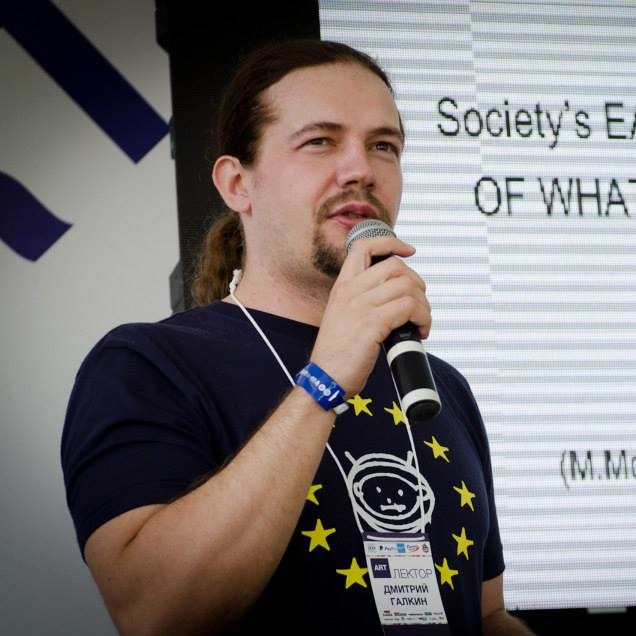
Dmitry Galkin
Dmitry is a Senior Researcher at the REC PAST-Centre, National Research Tomsk State University. He is the Doctor of Philosophy and Associate Professor of the Department of Humanitarian Problems of Informatics of the Faculty of Philosophy at the Lobachevsky State University of Nizhny Novgorod. Dmitry graduated from the Faculty of Philosophy, Tomsk State University, where in 2002 he defended his thesis in Virtualization of Experience in the Culture of Postmodern: Metamorphosis of the Discursive Landscape. He is engaged in research of cultural dynamics in the context of development of modern technologies. He has implemented a number of research projects, including the Methodology of Cultural Policy (University of Washington, USA), Techno-Art Hybridization: Art, Science and Technology (INTAS YSF, Lancaster University, UK), and Artificial Intelligence in Social Robotics (University of California, Berkeley, USA). In 2013, he defended his Doctor thesis on philosophical and methodological aspects of artificial life, called From Cybernetic Machines to Artificial Life: Theoretical and Historical and Cultural Aspects of the Formation of Digital Culture.
Our partners

Department of Interaction between Science, Technology, and Society at Moscow Technological Institute

Centre for Comparative History and Political Studies

The Maastricht University

European University at Saint-Petersburg
Entrance examinations
Entrance examinations include:
- Interview
- The entrance examination (oral)
Exam questions can be found here.
In preparing the answer at the exam, you can use printed and electronic materials (abstracts, a personal computer with Internet access, and others).
Entrance examinations may be conducted remotely.
For admission to entrance examinations, you must send the following documents to past.centre@gmail.com:
- motivation letter (not over than 1 Microsoft Word page, it can be written in English)
- previous Diploma with all applications (scanned)
- autobiography or CV
Other documents of scientific merits and personal achievements (optional): scientific, published, and reviewed works, articles, letters of recommendation, active participation with the use of a foreign language in conferences / workshops, scholarships / grants, and valid international English certificates (received during the last 3 years) reception of candidates is carried out in 2 stages:
- acceptance and evaluation of accepted documents
- successful candidates will be invited for an interview and to the entrance examinations
Admission to Master’s programs takes place on September 1 of each year.
The necessary skills and competencies for studying at the program:
- Bachelor’s Degree or Specialist’s Degree in Engineering, Medicine or Natural Sciences, Political Science, Sociology, and History. Preference will be given to candidates of Engineering, Medical or Natural Sciences. Graduates of humanities are required to have high scores / achievements
- knowledge of English
- self-organization and responsibility
- cultural openness and tolerance
- experience in industry or public service is desirable, but not necessary
The form of education is full-time, it is possible to form an individual educational trajectory.
Contacts
Building No. 2, Tomsk State University,
36 Lenin Ave.,
Phone: 8(3822)535-602